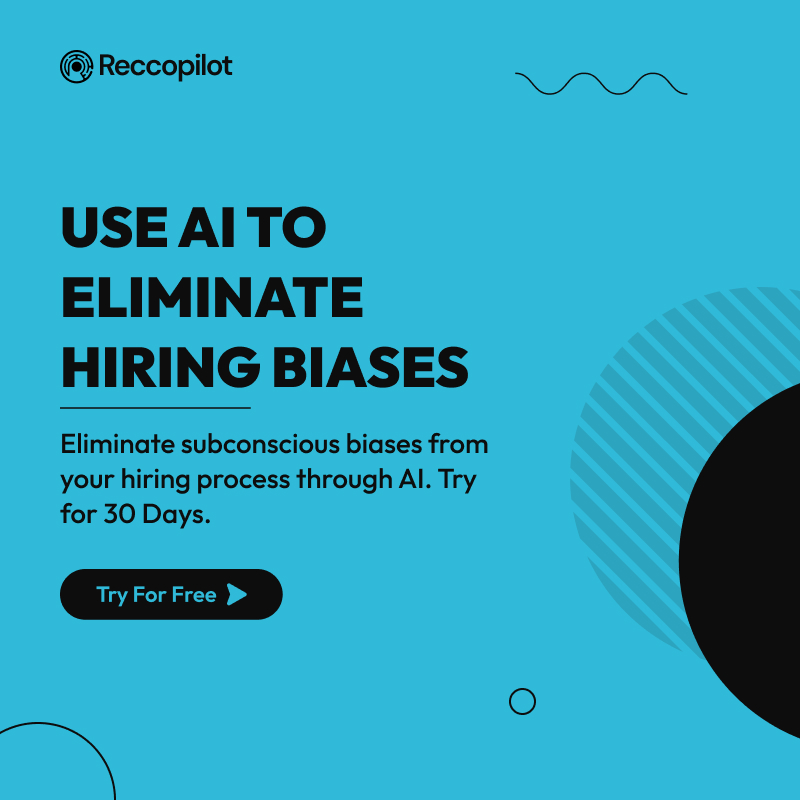How to Reduce Bias in the Hiring Process using AI: 5 Ways
Read Time
10 minutes
Updated On
January 9, 2026
.jpeg)
Ruchi Kumari
Content & Thought Leadership
.png)
Organizations today are placing greater emphasis on diversity, equity, and inclusion (DEI) as a central part of their talent strategy. According to SHRM’s 2024 report on AI in HR, AI in DEI initiatives is playing a transformative role in helping HR teams reduce bias and build more inclusive hiring practices.
Traditional hiring processes often fall short due to unconscious bias, inconsistent evaluation methods, and outdated systems that do not support equitable outcomes.

Artificial Intelligence (AI) is becoming a valuable tool for HR and talent acquisition teams looking at how to reduce bias in hiring process and build more inclusive hiring practices. While AI is not a complete solution on its own, when implemented thoughtfully and ethically, it can significantly support DEI goals.
Here is five impactful ways AI recruiter agent is helping organizations advance DEI in hiring while moving toward truly bias-free recruitment.
Bias often begins at the resume screening stage. Names, addresses, graduation years, and even hobbies can trigger unconscious bias, often without recruiters realizing it.
AI-powered applicant tracking systems (ATS) can anonymize candidate data, allowing recruiters to focus solely on qualifications, skills, and experience. By removing personally identifiable information, AI in DEI focused hiring helps ensure that candidates are evaluated on merit rather than assumptions.
This structured, data-driven approach is a foundational step in how to reduce bias in hiring process and creating a more equitable talent pipeline.
Language plays a critical role in shaping who applies for a job. Certain words and phrases in job descriptions can discourage qualified candidates from underrepresented groups. For example, terms like “rockstar” or “dominant” may skew masculine, while jargon-heavy descriptions can alienate non-native English speakers.
AI tools can analyze job postings for biased or exclusive language and suggest more inclusive alternatives. These tools help companies craft job descriptions that appeal to a broader, more diverse audience without compromising clarity or intent.
This not only supports DEI in hiring but also improves the overall candidate experience.

AI-driven scheduling tools ensure that every candidate receives the same level of attention and responsiveness, eliminating inconsistencies that can arise from manual coordination. More importantly, AI-powered assessments can evaluate candidates based on objective criteria such as problem-solving ability, communication skills, and job-specific competencies.
These assessments demonstrate how to reduce bias in hiring process by focusing on what candidates can do, rather than where they come from or who they know. When used correctly, they help standardize the evaluation process and reduce the influence of subjective judgment.
A 2024 peer-reviewed study published in MDPI confirms that AI significantly reduces bias in resume screening, interviews, and evaluations when implemented ethically and transparently.

AI provides valuable insights beyond the hiring process. By analyzing hiring data, AI can identify patterns and disparities across different stages of the recruitment funnel.
For example, are certain demographics dropping off after the first interview? Are specific job roles consistently lacking diversity? AI-powered analytics can surface these trends, enabling HR teams to take corrective action and track progress over time.
This level of transparency and accountability is essential for any organization serious about advancing DEI in hiring.
AI recruiters are dynamic and capable of learning over time. With regular audits, feedback loops, and ethical oversight, AI tools can be refined to ensure fairness and alignment with DEI goals.
It is important to remember that AI is only as unbiased as the data it is trained on. Human oversight remains critical. Organizations must invest in training, governance, and cross-functional collaboration to ensure that AI in DEI supports, rather than undermine, their DEI initiatives.
When implemented responsibly, AI becomes a strategic partner in building a more inclusive and equitable hiring process.
AI is not here to replace recruiters. It is here to empower them. By automating repetitive tasks, standardizing evaluations, and surfacing actionable insights, AI allows HR teams to focus on what truly matters: building diverse, high-performing teams.
The journey toward bias-free hiring is ongoing. With the right tools and a clear strategy, AI can help organizations make meaningful progress. DEI in hiring is no longer optional. It is a business imperative. And AI, when used ethically and intentionally, is one of the most powerful tools available to support that mission.
To explore more insights and tools that support inclusive hiring, visit Reccopilot.
